人教版(2019)必修 第一册Unit 5 Languages around the world Discovering Useful Structures 课件(共31张PPT)
文档属性
| 名称 | 人教版(2019)必修 第一册Unit 5 Languages around the world Discovering Useful Structures 课件(共31张PPT) | 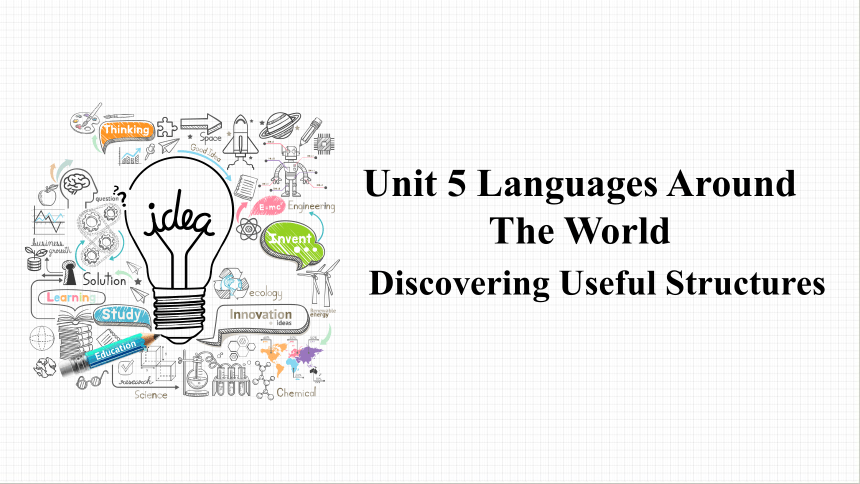 | |
| 格式 | pptx | ||
| 文件大小 | 2.3MB | ||
| 资源类型 | 教案 | ||
| 版本资源 | 人教版(2019) | ||
| 科目 | 英语 | ||
| 更新时间 | 2024-10-09 12:18:52 | ||
图片预览

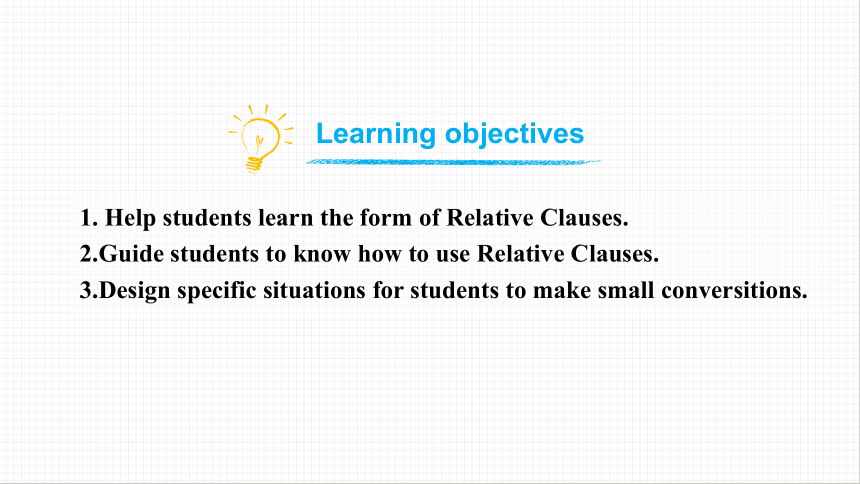
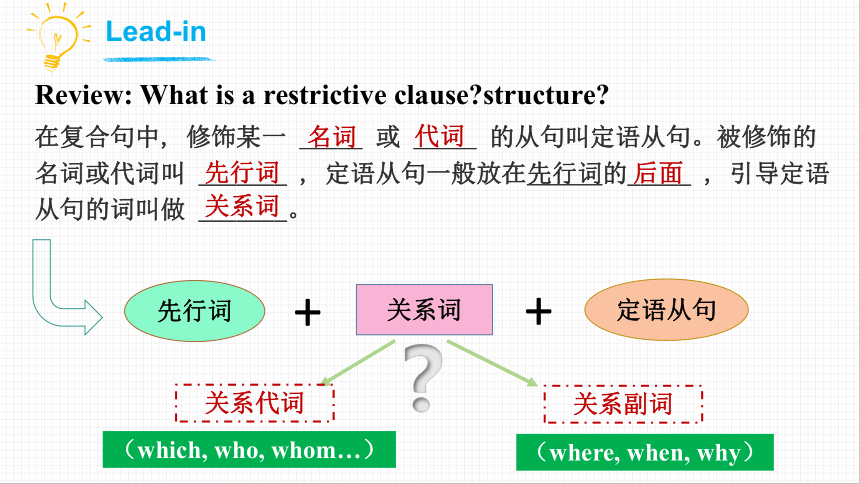
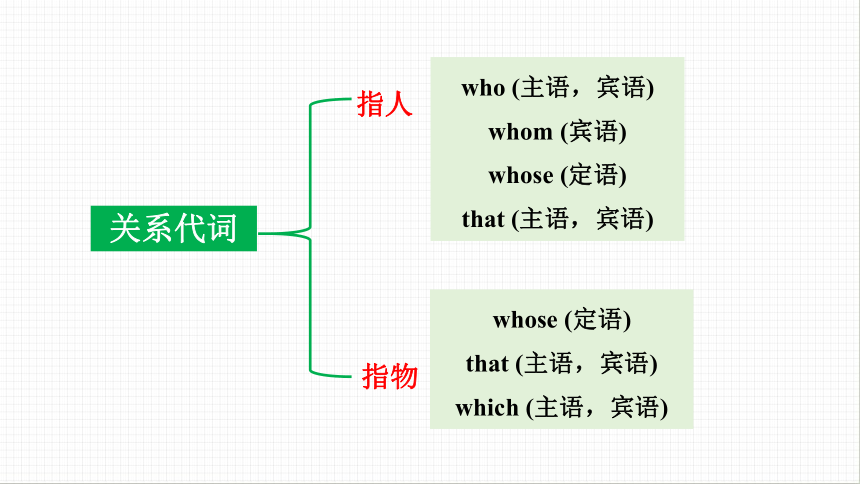
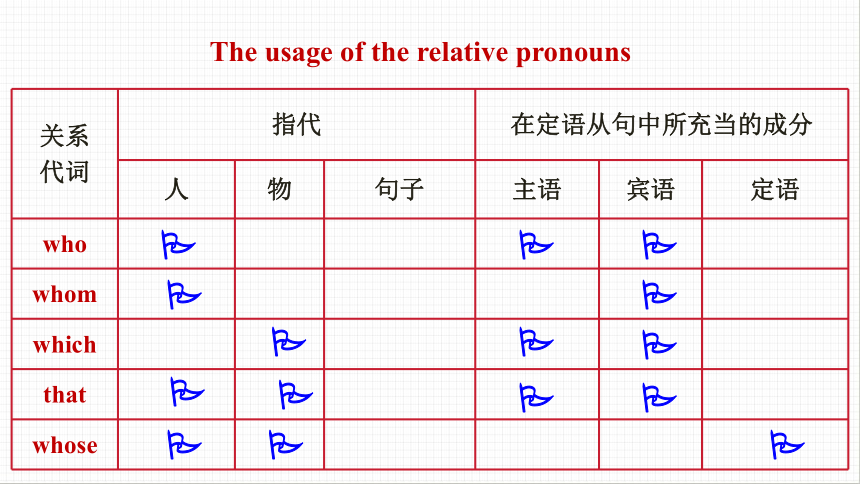
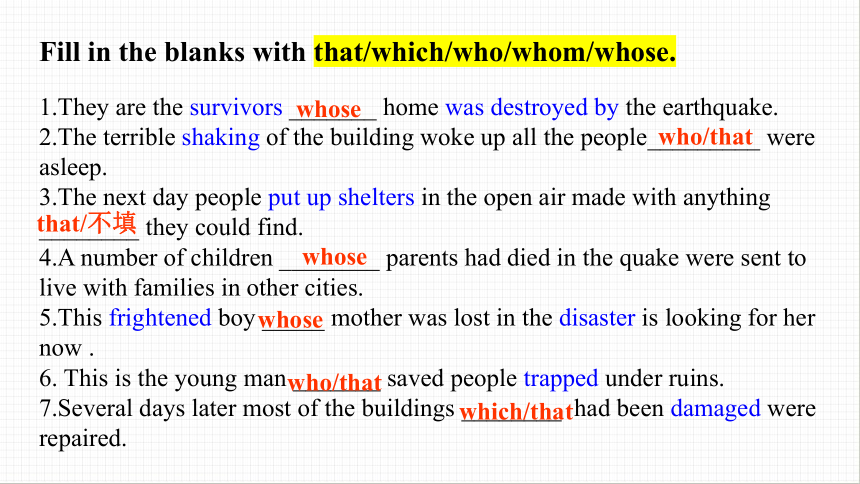
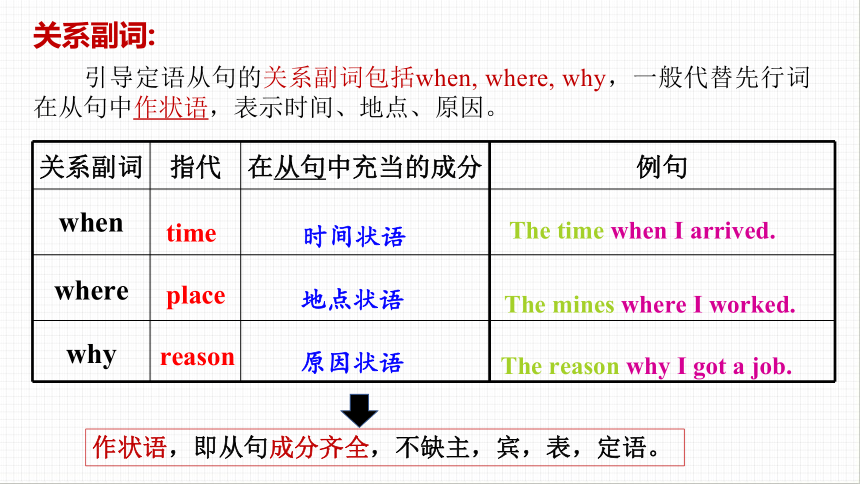
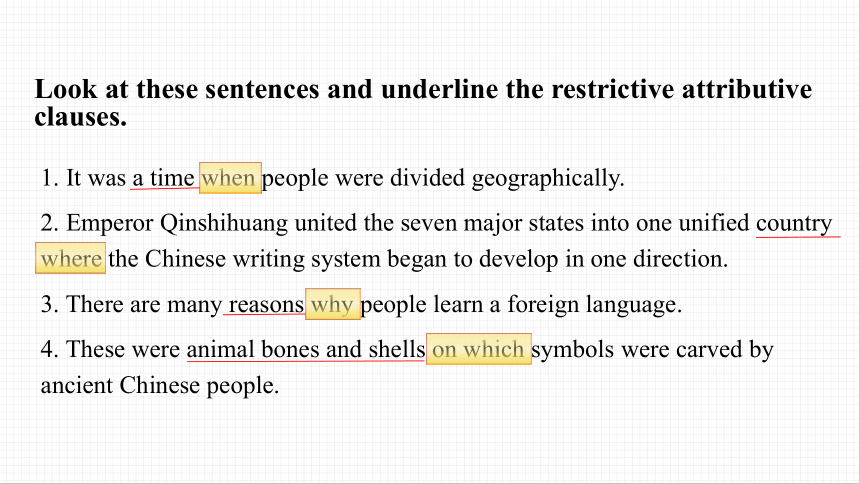
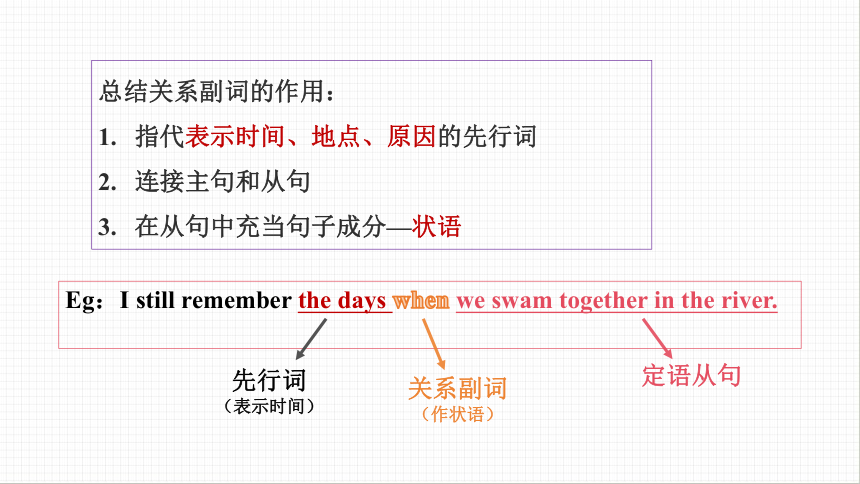
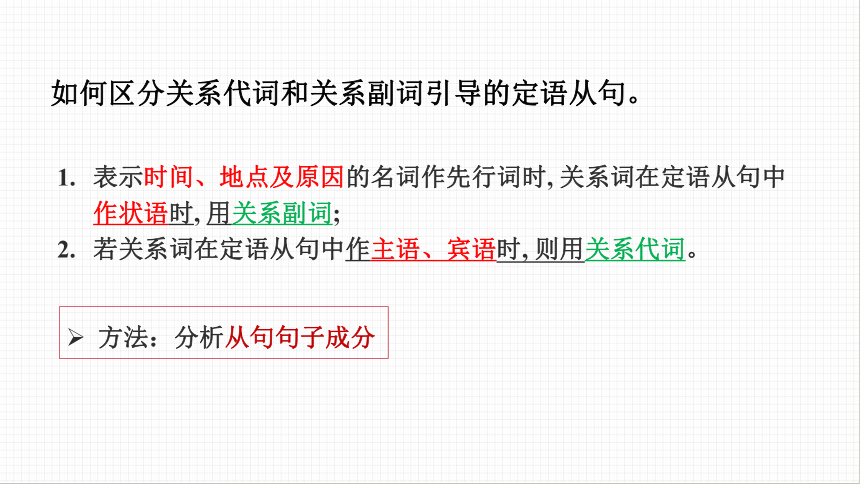
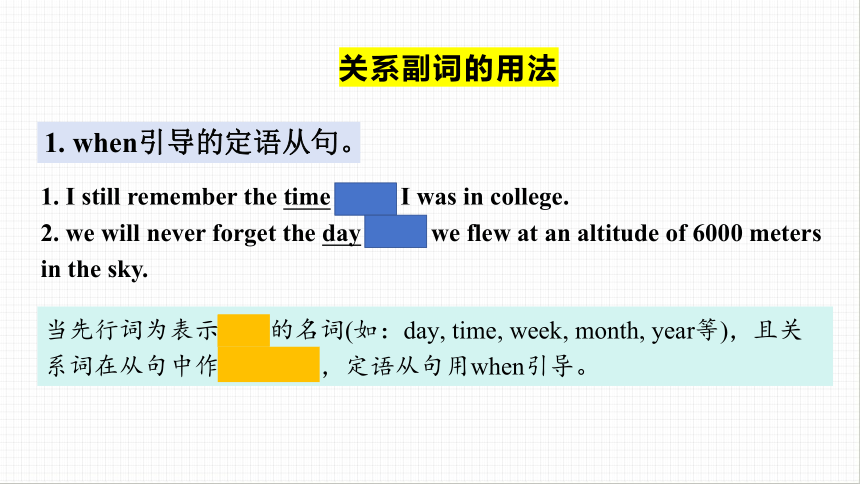
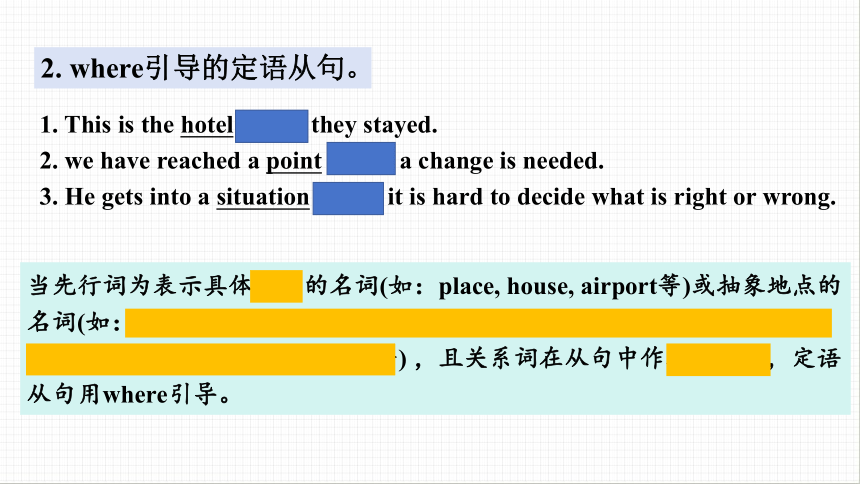
文档简介
(共31张PPT)
Discovering Useful Structures
Unit 5 Languages Around The World
1. Help students learn the form of Relative Clauses.
2.Guide students to know how to use Relative Clauses.
3.Design specific situations for students to make small conversitions.
Learning objectives
Review: What is a restrictive clause structure
在复合句中, 修饰某一 _____ 或 _____ 的从句叫定语从句。被修饰的名词或代词叫 _______ , 定语从句一般放在先行词的_____ , 引导定语从句的词叫做 _______。
先行词
后面
关系词
名词
代词
先行词
关系词
定语从句
+
+
关系代词
关系副词
(which, who, whom…)
(where, when, why)
Lead-in
关系代词
指人
指物
who (主语,宾语)
whom (宾语)
whose (定语)
that (主语,宾语)
whose (定语)
that (主语,宾语)
which (主语,宾语)
关系 代词 指代 在定语从句中所充当的成分 人 物 句子 主语 宾语 定语
who
whom
which
that
whose
The usage of the relative pronouns
1.They are the survivors _______ home was destroyed by the earthquake.
2.The terrible shaking of the building woke up all the people_________ were asleep.
3.The next day people put up shelters in the open air made with anything ________ they could find.
4.A number of children ________ parents had died in the quake were sent to live with families in other cities.
5.This frightened boy _____ mother was lost in the disaster is looking for her now .
6. This is the young man _______ saved people trapped under ruins.
7.Several days later most of the buildings ________ had been damaged were repaired.
who/that
whose
which/that
whose
who/that
whose
Fill in the blanks with that/which/who/whom/whose.
that/不填
关系副词:
time
时间状语
place
reason
地点状语
原因状语
作状语,即从句成分齐全,不缺主,宾,表,定语。
引导定语从句的关系副词包括when, where, why,一般代替先行词在从句中作状语,表示时间、地点、原因。
The time when I arrived.
The mines where I worked.
The reason why I got a job.
关系副词 指代 在从句中充当的成分 例句
when
where
why
1. It was a time when people were divided geographically.
2. Emperor Qinshihuang united the seven major states into one unified country where the Chinese writing system began to develop in one direction.
3. There are many reasons why people learn a foreign language.
4. These were animal bones and shells on which symbols were carved by ancient Chinese people.
Look at these sentences and underline the restrictive attributive clauses.
Eg:I still remember the days when we swam together in the river.
总结关系副词的作用:
指代表示时间、地点、原因的先行词
连接主句和从句
在从句中充当句子成分—状语
先行词
(表示时间)
关系副词
(作状语)
定语从句
如何区分关系代词和关系副词引导的定语从句。
表示时间、地点及原因的名词作先行词时, 关系词在定语从句中作状语时, 用关系副词;
若关系词在定语从句中作主语、宾语时, 则用关系代词。
方法:分析从句句子成分
1. when引导的定语从句。
当先行词为表示时间的名词(如:day, time, week, month, year等),且关系词在从句中作时间状语,定语从句用when引导。
1. I still remember the time when I was in college.
2. we will never forget the day when we flew at an altitude of 6000 meters in the sky.
关系副词的用法
2. where引导的定语从句。
当先行词为表示具体地点的名词(如:place, house, airport等)或抽象地点的名词(如:point, case, activity, situation, position, occasion, platform, email,stage,scene等) ,且关系词在从句中作地点状语,定语从句用where引导。
1. This is the hotel where they stayed.
2. we have reached a point where a change is needed.
3. He gets into a situation where it is hard to decide what is right or wrong.
3. why引导的定语从句。
当先行词为表示原因的名词reason,且关系词在从句中作原因状语,定语从句用why引导。
1. This is the reason why he left in a hurry.
2. I don’t know the reason why he didn’t turn to his friends for help yesterday.
4. “介词+关系代词”引导的定语从句。
1. when相当于“ at/in/on/during等 + which”
I remember the day ________________ I settled in China.
2. where 相当于“ in/at/on等 + which”
The house ________________ Mark lived is now a library.
3. why 相当于“for + which”
Is that the reason ______________ she suddenly changed her mind
1)关系副词when,where,why引导定语从句时,也可用“介词+which”代替关系副词。
when (=on which)
where (=in which)
why (=for which)
4. “介词+关系代词”引导的定语从句。
1. This is the student __________ I bought a book.
2. This is the ship _________ I went to Shanghai.
2)在“介词+关系代词”引导的定语从句中,关系代词只能用which或whom,不可用that/who。先行词指物时用which,先行词指人时用whom。
for whom
by which
选用介词的依据
1. 根据先行词的搭配,, 从句中的动词、形容词等的搭配 (即固定短语)。
(1)Yesterday we visited the West Lake ___________ Hangzhou is famous.
(2) He is the student___________we should learn.
(3) I remember the days ____________I lived here.
(4) I can’t remember the age _________he won the prize.
2. 根据句子的意思来选择。
(5) This is the pilot _________ my brother has worked for ten years.
(6) This is the pilot ___________ my son was saved.
for which
from whom
during which
at which
with whom
by whom
3) “名词,不定代词或数词 + of + which (指物)/whom (指人)”在定语从句中作主语,说明整体中的一部分。
1. China has lots of islands, ____________ is Hainan Island.
2. The building had been repaired, _________________ was destroyed again in a big fire.
3. Miss Liu has a lot of students, ______________ are girls.
one of which
the roof of which
some of whom
4. “介词+关系代词”引导的定语从句。
4. “介词+关系代词”引导的定语从句。
1、介词选择的三原则:一先二动三意义。
一先:根据先行词的搭配习惯来确定。
二动:根据从句中谓语动词的搭配习惯来确定。
三意义:根据从句所表达的意义来确定。
关系副词 — where特殊用法
Eg: The accident has reached to the point both their parents are to be called in.
where 还可用在表示抽象意义的地点名词后, 如 situation (情形), stage (阶段), point (地步), case (情况), position (位置), condition, activity, scene, occasion等,意思是“到了某种地步, 在某种境况或情况中” 。
where
关系副词 — where特殊用法
并非所有的表示时间、地点、原因的先行词,后面的定语从句都用when和where引导。如果定语从句中缺少主语或宾语,就要用that或which引导。
This is the house _____________ my father built last year.
Do you still remember the days ___________ we spent in the countryside
that/which
that/which
结论:
先行词表时间、地点、原因
关系词在从句中作状语
定语从句三步解体法:
一、划出定语从句;
二、判断关系词在从句中做的成分———主宾表:关系代词;状:关系副词
三、根据先行词确定关系词
定
语
从
句
的
引
导
词
关系代词
关系副词
指人
指物
that(主语/宾语/表语), which(主语/宾语),who(主语/宾语), whom(宾语), whose(定语),as(主语/宾语/表语)
that(主语、宾语), which(主语、宾语), whose(定语)
where (地点状语)
when (时间状语)
why (原因状语)
Ps:关系词在从句中做状语时,连接词有时可以用介词+which/whom来替换关系副词
Important points:
考点一:如何选择关系代词前的介词
1. XXX is a great teacher______ whom we are all grateful.
to
2.XXX is an excellent student______ whom I always learn a lot.
from
for
3. Visitors across the globe come to visit Terra Cotta Warriors, one of the wonders in the world,______ which Xi’an is famous.
4. Gratitude is important in our life _______ which we can’t live a full life.
5. There are 40 students in our class, 24 _____ whom are boys.
without
of
Important points:
考点二:关系代词or关系副词
1. I will never forget the day __________we spent together.
2. I will never forget the day ______ we met the first time.
which/that
when
3.This is the place _________ I love very much.
4.This is the place ________ I have stayed for three years.
that/which
where
5.The reason _______ the teacher was happy was that we gave a good performance.
6. The reason_______ he explained is acceptable.
why
that
Important points:
考点三:定语从句or强调句型
1. It is September _____ I began to study in Huanggang Middle school.
2. It is in September _____ I began to study in Huanggang Middle school.
when
that
指原因
关系代词
指代事物
指时间
指地点
所属关系
指代人
关系副词
who, whom, that
which, that
whose, of which
where
when
why
Summary
1. Complete the twe passages with the correct relative adverbs or pronouns. Add a preposition where necessary.
When I started studying German, it was a struggle. The words felt strange on my tongue, and the grammar would not stay in my head. I told my mum that I wanted to give up, and that I would never live in a country _______________ German was spoken. My mum told me that studying a language was not just for my future. It was exercise for the brain; the more I learnt of a language, the more my brain would grow. And I remember that day _______________ I suddenly felt like German was no longer a foreign language. It felt like my brain had doubled in size. I had finally come to a place _______I could think in this foreign language, and I could see the world from a different point of view. I felt as if I had reached the goal ___________ I had been fighting for. I could open a book and see meanings, not just a sea of words. I finally understood the reason ______my mum had encouraged me not to give up. Thanks, Mum!
where/in which
when/on which
where
which/that
why
Practice
My friend—Cilla
I have a new friend _______ name is Cilla. I first met her in 1999 ____ we were in junior one. She was a little shy and introverted(内向的). But when I know more about her, I found she always kept an optimistic attitude to the life, ______ impressed me a lot. To tell you the truth, I like the way __________
she treated life and friends. That’s the reason____ we become good friends. It is 2012_______she got her master degree from Xi’an International Studies University ______ is the best foreign language university in Northwest. After graduation, she works as a teacher in a small county ______her husband lives in for 8 years. Now she is teaching in Guanggang Middle school ______ many excellent students are struggling for their dream.
whose
when
which
that/inwhich/不填
why
when
which
which
where
2. Work in pairs. Ask and answer questions.
3.单句语法填空
1.The days _______ they travelled together meant a lot to him.
2.Nobody knows the reason _______ she didn't go to the party.
3.We visited the house _______ the famous scientist once lived.
4.The car _______ window got broken in the accident belongs to Mr. Brown.
5.The Smiths have two children, both of _______ work in New York.
6.Miss Liu is an excellent teacher _______ whom I have learnt a lot.
7.We have come to a point _______ everyone has different opinions and it is difficult to reach an agreement.
when
why
where
whose
whom
from
where
4. 用定语从句合并句子
1.I love my hometown. I feel proud of it.
__________________________________________________________
2.There is a table in the house. There are some bananas on it.
__________________________________________________________
3.I will remember the days forever. We spent the days together.
__________________________________________________________
→I love my hometown of which I feel proud.
→There is a table in the house where/ on which there are some bananas.
→I will remember the days which/ that we spent together forever.
用定语从句合并句子
4.There are forty students in our class. Twenty of the students in our class are girls.
__________________________________________________________
5.We'll go to see the famous singer. We have often talked about the famous singer.
__________________________________________________________
→We'll go to see the famous singer about whom we have often talked.
→There are forty students in our class, twenty of whom are girls.
Discovering Useful Structures
Unit 5 Languages Around The World
1. Help students learn the form of Relative Clauses.
2.Guide students to know how to use Relative Clauses.
3.Design specific situations for students to make small conversitions.
Learning objectives
Review: What is a restrictive clause structure
在复合句中, 修饰某一 _____ 或 _____ 的从句叫定语从句。被修饰的名词或代词叫 _______ , 定语从句一般放在先行词的_____ , 引导定语从句的词叫做 _______。
先行词
后面
关系词
名词
代词
先行词
关系词
定语从句
+
+
关系代词
关系副词
(which, who, whom…)
(where, when, why)
Lead-in
关系代词
指人
指物
who (主语,宾语)
whom (宾语)
whose (定语)
that (主语,宾语)
whose (定语)
that (主语,宾语)
which (主语,宾语)
关系 代词 指代 在定语从句中所充当的成分 人 物 句子 主语 宾语 定语
who
whom
which
that
whose
The usage of the relative pronouns
1.They are the survivors _______ home was destroyed by the earthquake.
2.The terrible shaking of the building woke up all the people_________ were asleep.
3.The next day people put up shelters in the open air made with anything ________ they could find.
4.A number of children ________ parents had died in the quake were sent to live with families in other cities.
5.This frightened boy _____ mother was lost in the disaster is looking for her now .
6. This is the young man _______ saved people trapped under ruins.
7.Several days later most of the buildings ________ had been damaged were repaired.
who/that
whose
which/that
whose
who/that
whose
Fill in the blanks with that/which/who/whom/whose.
that/不填
关系副词:
time
时间状语
place
reason
地点状语
原因状语
作状语,即从句成分齐全,不缺主,宾,表,定语。
引导定语从句的关系副词包括when, where, why,一般代替先行词在从句中作状语,表示时间、地点、原因。
The time when I arrived.
The mines where I worked.
The reason why I got a job.
关系副词 指代 在从句中充当的成分 例句
when
where
why
1. It was a time when people were divided geographically.
2. Emperor Qinshihuang united the seven major states into one unified country where the Chinese writing system began to develop in one direction.
3. There are many reasons why people learn a foreign language.
4. These were animal bones and shells on which symbols were carved by ancient Chinese people.
Look at these sentences and underline the restrictive attributive clauses.
Eg:I still remember the days when we swam together in the river.
总结关系副词的作用:
指代表示时间、地点、原因的先行词
连接主句和从句
在从句中充当句子成分—状语
先行词
(表示时间)
关系副词
(作状语)
定语从句
如何区分关系代词和关系副词引导的定语从句。
表示时间、地点及原因的名词作先行词时, 关系词在定语从句中作状语时, 用关系副词;
若关系词在定语从句中作主语、宾语时, 则用关系代词。
方法:分析从句句子成分
1. when引导的定语从句。
当先行词为表示时间的名词(如:day, time, week, month, year等),且关系词在从句中作时间状语,定语从句用when引导。
1. I still remember the time when I was in college.
2. we will never forget the day when we flew at an altitude of 6000 meters in the sky.
关系副词的用法
2. where引导的定语从句。
当先行词为表示具体地点的名词(如:place, house, airport等)或抽象地点的名词(如:point, case, activity, situation, position, occasion, platform, email,stage,scene等) ,且关系词在从句中作地点状语,定语从句用where引导。
1. This is the hotel where they stayed.
2. we have reached a point where a change is needed.
3. He gets into a situation where it is hard to decide what is right or wrong.
3. why引导的定语从句。
当先行词为表示原因的名词reason,且关系词在从句中作原因状语,定语从句用why引导。
1. This is the reason why he left in a hurry.
2. I don’t know the reason why he didn’t turn to his friends for help yesterday.
4. “介词+关系代词”引导的定语从句。
1. when相当于“ at/in/on/during等 + which”
I remember the day ________________ I settled in China.
2. where 相当于“ in/at/on等 + which”
The house ________________ Mark lived is now a library.
3. why 相当于“for + which”
Is that the reason ______________ she suddenly changed her mind
1)关系副词when,where,why引导定语从句时,也可用“介词+which”代替关系副词。
when (=on which)
where (=in which)
why (=for which)
4. “介词+关系代词”引导的定语从句。
1. This is the student __________ I bought a book.
2. This is the ship _________ I went to Shanghai.
2)在“介词+关系代词”引导的定语从句中,关系代词只能用which或whom,不可用that/who。先行词指物时用which,先行词指人时用whom。
for whom
by which
选用介词的依据
1. 根据先行词的搭配,, 从句中的动词、形容词等的搭配 (即固定短语)。
(1)Yesterday we visited the West Lake ___________ Hangzhou is famous.
(2) He is the student___________we should learn.
(3) I remember the days ____________I lived here.
(4) I can’t remember the age _________he won the prize.
2. 根据句子的意思来选择。
(5) This is the pilot _________ my brother has worked for ten years.
(6) This is the pilot ___________ my son was saved.
for which
from whom
during which
at which
with whom
by whom
3) “名词,不定代词或数词 + of + which (指物)/whom (指人)”在定语从句中作主语,说明整体中的一部分。
1. China has lots of islands, ____________ is Hainan Island.
2. The building had been repaired, _________________ was destroyed again in a big fire.
3. Miss Liu has a lot of students, ______________ are girls.
one of which
the roof of which
some of whom
4. “介词+关系代词”引导的定语从句。
4. “介词+关系代词”引导的定语从句。
1、介词选择的三原则:一先二动三意义。
一先:根据先行词的搭配习惯来确定。
二动:根据从句中谓语动词的搭配习惯来确定。
三意义:根据从句所表达的意义来确定。
关系副词 — where特殊用法
Eg: The accident has reached to the point both their parents are to be called in.
where 还可用在表示抽象意义的地点名词后, 如 situation (情形), stage (阶段), point (地步), case (情况), position (位置), condition, activity, scene, occasion等,意思是“到了某种地步, 在某种境况或情况中” 。
where
关系副词 — where特殊用法
并非所有的表示时间、地点、原因的先行词,后面的定语从句都用when和where引导。如果定语从句中缺少主语或宾语,就要用that或which引导。
This is the house _____________ my father built last year.
Do you still remember the days ___________ we spent in the countryside
that/which
that/which
结论:
先行词表时间、地点、原因
关系词在从句中作状语
定语从句三步解体法:
一、划出定语从句;
二、判断关系词在从句中做的成分———主宾表:关系代词;状:关系副词
三、根据先行词确定关系词
定
语
从
句
的
引
导
词
关系代词
关系副词
指人
指物
that(主语/宾语/表语), which(主语/宾语),who(主语/宾语), whom(宾语), whose(定语),as(主语/宾语/表语)
that(主语、宾语), which(主语、宾语), whose(定语)
where (地点状语)
when (时间状语)
why (原因状语)
Ps:关系词在从句中做状语时,连接词有时可以用介词+which/whom来替换关系副词
Important points:
考点一:如何选择关系代词前的介词
1. XXX is a great teacher______ whom we are all grateful.
to
2.XXX is an excellent student______ whom I always learn a lot.
from
for
3. Visitors across the globe come to visit Terra Cotta Warriors, one of the wonders in the world,______ which Xi’an is famous.
4. Gratitude is important in our life _______ which we can’t live a full life.
5. There are 40 students in our class, 24 _____ whom are boys.
without
of
Important points:
考点二:关系代词or关系副词
1. I will never forget the day __________we spent together.
2. I will never forget the day ______ we met the first time.
which/that
when
3.This is the place _________ I love very much.
4.This is the place ________ I have stayed for three years.
that/which
where
5.The reason _______ the teacher was happy was that we gave a good performance.
6. The reason_______ he explained is acceptable.
why
that
Important points:
考点三:定语从句or强调句型
1. It is September _____ I began to study in Huanggang Middle school.
2. It is in September _____ I began to study in Huanggang Middle school.
when
that
指原因
关系代词
指代事物
指时间
指地点
所属关系
指代人
关系副词
who, whom, that
which, that
whose, of which
where
when
why
Summary
1. Complete the twe passages with the correct relative adverbs or pronouns. Add a preposition where necessary.
When I started studying German, it was a struggle. The words felt strange on my tongue, and the grammar would not stay in my head. I told my mum that I wanted to give up, and that I would never live in a country _______________ German was spoken. My mum told me that studying a language was not just for my future. It was exercise for the brain; the more I learnt of a language, the more my brain would grow. And I remember that day _______________ I suddenly felt like German was no longer a foreign language. It felt like my brain had doubled in size. I had finally come to a place _______I could think in this foreign language, and I could see the world from a different point of view. I felt as if I had reached the goal ___________ I had been fighting for. I could open a book and see meanings, not just a sea of words. I finally understood the reason ______my mum had encouraged me not to give up. Thanks, Mum!
where/in which
when/on which
where
which/that
why
Practice
My friend—Cilla
I have a new friend _______ name is Cilla. I first met her in 1999 ____ we were in junior one. She was a little shy and introverted(内向的). But when I know more about her, I found she always kept an optimistic attitude to the life, ______ impressed me a lot. To tell you the truth, I like the way __________
she treated life and friends. That’s the reason____ we become good friends. It is 2012_______she got her master degree from Xi’an International Studies University ______ is the best foreign language university in Northwest. After graduation, she works as a teacher in a small county ______her husband lives in for 8 years. Now she is teaching in Guanggang Middle school ______ many excellent students are struggling for their dream.
whose
when
which
that/inwhich/不填
why
when
which
which
where
2. Work in pairs. Ask and answer questions.
3.单句语法填空
1.The days _______ they travelled together meant a lot to him.
2.Nobody knows the reason _______ she didn't go to the party.
3.We visited the house _______ the famous scientist once lived.
4.The car _______ window got broken in the accident belongs to Mr. Brown.
5.The Smiths have two children, both of _______ work in New York.
6.Miss Liu is an excellent teacher _______ whom I have learnt a lot.
7.We have come to a point _______ everyone has different opinions and it is difficult to reach an agreement.
when
why
where
whose
whom
from
where
4. 用定语从句合并句子
1.I love my hometown. I feel proud of it.
__________________________________________________________
2.There is a table in the house. There are some bananas on it.
__________________________________________________________
3.I will remember the days forever. We spent the days together.
__________________________________________________________
→I love my hometown of which I feel proud.
→There is a table in the house where/ on which there are some bananas.
→I will remember the days which/ that we spent together forever.
用定语从句合并句子
4.There are forty students in our class. Twenty of the students in our class are girls.
__________________________________________________________
5.We'll go to see the famous singer. We have often talked about the famous singer.
__________________________________________________________
→We'll go to see the famous singer about whom we have often talked.
→There are forty students in our class, twenty of whom are girls.
